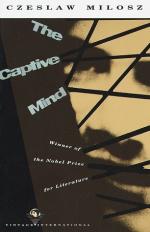
|
| Name: _________________________ | Period: ___________________ |
This test consists of 15 multiple choice questions and 5 short answer questions.
Multiple Choice Questions
1. In the eyes of the besieged Pole, what is the only poetry that will last?
(a) Poetry that has most affected the writer.
(b) Poetry that is most vivid to the reader.
(c) Poetry that is most amusing.
(d) Poetry that is unquestionably real.
2. How prevalent is National Ketman?
(a) Limited to the upper circles of the party.
(b) Limited to the people who have no power within the party.
(c) Widespread throughout communist society.
(d) Not of concern to the center.
3. Why did the new communist government have a difficult time in Poland after World War II?
(a) The citizens did not want them there.
(b) Moscow had sent too few leaders.
(c) They were unprepared for the hardship.
(d) The modes of transportation were insufficient.
4. Within communist countries, it is not important what a man says but:
(a) How it is received.
(b) How he says it.
(c) Who hears him.
(d) What he wanted to say.
5. Alpha's pursuit of purity in his work was driven largely by what characteristic?
(a) Devotion to the church.
(b) Personal arrogance.
(c) Jaded view of the world.
(d) Sense of personal purity.
6. How do the inhabitants of communist countries appear?
(a) Uniformly short and stocky.
(b) Predominantly tall and well-dressed.
(c) Mostly Aryan, following the decimation of the Jewish population in World War II.
(d) Diverse according to their racial heritages.
7. American politics regarded Russia's invasion of Eastern countries with what emotion?
(a) Anger.
(b) Fear.
(c) Scorn.
(d) Apathy.
8. According to Milosz, nations which have recently come under communist rule feel excitement at first, and then feel what emotion?
(a) That they've been lied to about the government.
(b) Sadness for the loss of their autonomy.
(c) Trepidation for their unknown future.
(d) That they've been caught in a trap like mice.
9. According to several examples from Eastern history, how is Ketman a way of living?
(a) Appearing obedient while harboring heresy.
(b) Remaining completely obedient.
(c) Appearing obedient while exposing heresy in others.
(d) Flaunting heresy.
10. What event did Alpha and Milosz narrowly miss one day as they were returning from the train station?
(a) The outbreak of a street fight.
(b) Being run over by a truck full of Jews bound for Auschwitz.
(c) Being captured in the first man-hunt for Auschwitz.
(d) Being searched by Nazi squads.
11. Aesthetic Ketman spreads because the citizens crave what aspect of daily life?
(a) Superficiality.
(b) Similarity.
(c) Sameness.
(d) Strangeness.
12. Milosz says that an individual has no more significance to the muse of history than what object?
(a) A cog in a machine.
(b) An instrument in an orchestra.
(c) A weed in a field.
(d) An atom in space.
13. In Chapter 4, who is Alpha, the Moralist?
(a) A well-known prose writer, a good friend of Milosz.
(b) A well-known poet, a good friend of Milosz.
(c) A little-known prose writer, a good friend of Milosz.
(d) A well-known prose writer not personally known to Milosz.
14. Citizens of communist countries become adept in what skill, according to Milosz?
(a) Imitating.
(b) Acting.
(c) Persuading.
(d) Reasoning.
15. Cosmopolitanism, as defined by communism, is what thought?
(a) Admiration for the Western bourgeois cultures.
(b) Admiration for all cultures.
(c) Fear of the Western bourgeois cultures.
(d) Admiration for all countries in the communist bloc.
Short Answer Questions
1. Milosz ends Chapter I with the question:
2. What do the Party dialecticians assert about art?
3. In the mid-twentieth century, many European nations realized that they could be directly influenced by what force?
4. According the Chapter 2, what does the Method emphasize about change?
5. Peasants, in Milosz's understanding, assert what about their lives?
|
This section contains 640 words (approx. 3 pages at 300 words per page) |

|




